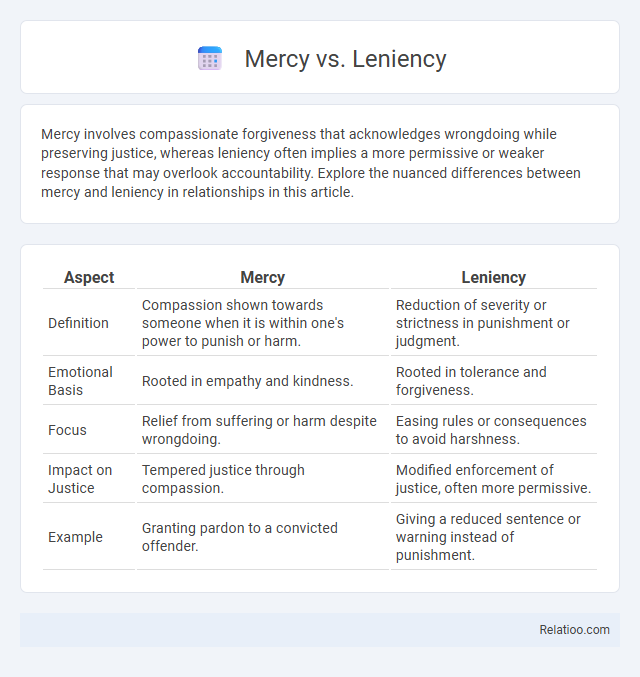Mercy involves compassionate forgiveness that acknowledges wrongdoing while preserving justice, whereas leniency often implies a more permissive or weaker response that may overlook accountability. Explore the nuanced differences between mercy and leniency in relationships in this article.
Table of Comparison
| Aspect | Mercy | Leniency |
|---|---|---|
| Definition | Compassion shown towards someone when it is within one's power to punish or harm. | Reduction of severity or strictness in punishment or judgment. |
| Emotional Basis | Rooted in empathy and kindness. | Rooted in tolerance and forgiveness. |
| Focus | Relief from suffering or harm despite wrongdoing. | Easing rules or consequences to avoid harshness. |
| Impact on Justice | Tempered justice through compassion. | Modified enforcement of justice, often more permissive. |
| Example | Granting pardon to a convicted offender. | Giving a reduced sentence or warning instead of punishment. |
Understanding Mercy and Leniency: Key Definitions
Mercy involves showing compassion or forgiveness toward someone who deserves punishment, emphasizing empathy and kindness in your response. Leniency refers to the act of granting a lighter penalty or tolerance, often influenced by circumstances or relationships, reflecting a more flexible application of rules. Understanding the distinction between mercy and leniency is crucial for making informed decisions that balance justice with compassion.
Historical Perspectives on Mercy and Leniency
Historical perspectives on mercy and leniency reveal distinct applications rooted in cultural and legal traditions. Mercy often reflects compassion shown by authority figures, such as monarchs or judges, who could pardon or reduce punishments based on moral grounds or social status, emphasizing forgiveness over strict justice. Leniency typically denotes a more systemic approach within legal frameworks aimed at moderating penalties, balancing deterrence with rehabilitation, and Your understanding of these concepts can enhance appreciation of their evolving roles in justice systems.
The Philosophical Foundations of Mercy
Mercy is grounded in ethical principles of compassion and justice, emphasizing forgiveness and alleviation of suffering beyond strict legal obligations. Philosophical foundations of mercy explore the balance between leniency, which often implies reducing severity of punishment, and genuine mercy that reflects moral grace and human dignity. Mercy transcends leniency by invoking a deeper moral rationale rooted in empathy, ethical responsibility, and the recognition of shared humanity.
Leniency in Legal Systems: Practice and Implications
Leniency in legal systems refers to the deliberate reduction of punishment severity as a strategic measure to encourage cooperation, such as plea bargaining or whistleblowing. This practice balances justice and pragmatism by incentivizing offenders to provide valuable information while maintaining legal integrity. Your understanding of leniency highlights its role in promoting efficient case resolution and enhancing law enforcement effectiveness.
Comparing Mercy and Leniency: Core Differences
Mercy involves compassionate forgiveness shown towards someone whom it is within one's power to punish or harm, emphasizing empathy and grace beyond strict justice. Leniency refers to a more tolerant or mild approach in enforcing rules or penalties, often reducing severity without necessarily invoking compassion or forgiveness. The core difference lies in mercy's basis on kindness and moral choice, whereas leniency centers on moderation and flexibility in judgment or punishment.
The Role of Intent in Mercy vs Leniency
The role of intent in mercy versus leniency is crucial in distinguishing these concepts; mercy involves a compassionate response to wrongdoing that seeks to forgive and restore, often driven by empathy and understanding of circumstances. Leniency, however, refers to a milder punishment or judgment, typically motivated by practical considerations rather than deeper moral reflection. Your perception of justice may vary depending on whether intent prioritizes empathy in mercy or pragmatism in leniency.
Psychological Impacts of Mercy and Leniency
Mercy and leniency, while often used interchangeably, impact psychological well-being differently; mercy typically involves compassion beyond what is deserved, fostering deep emotional relief and restoration of self-worth, whereas leniency reduces severity of punishment, promoting forgiveness but sometimes leading to perceived injustice or reduced accountability. Psychological studies show that receiving mercy can enhance empathy, improve mental health, and encourage prosocial behavior, whereas leniency may decrease stress but potentially undermine motivation for change. Understanding these distinctions is crucial for legal, social, and therapeutic settings where emotional outcomes significantly influence rehabilitation and interpersonal dynamics.
Societal Outcomes: Is Mercy or Leniency More Effective?
Mercy often leads to restorative justice by addressing the root causes of wrongdoing and fostering rehabilitation, which can reduce recidivism and strengthen community trust. Leniency, while lighter in punishment, may sometimes undermine deterrence if perceived as inconsistency or weakness in the legal system. Societal outcomes show that mercy, rooted in compassion and fairness, promotes long-term social cohesion more effectively than mere leniency.
Mercy and Leniency in Leadership and Governance
Mercy in leadership reflects compassionate forgiveness that upholds justice while promoting trust and loyalty among followers and citizens. Leniency involves a more flexible, often softer approach to enforcement, which can foster goodwill but risks undermining authority if overused. Your ability to balance mercy and leniency influences governance effectiveness by ensuring fairness without compromising discipline or accountability.
Striking the Balance: When to Apply Mercy or Leniency
Striking the balance between mercy and leniency requires understanding their distinct impacts on justice and compassion. Mercy involves compassionately reducing punishment despite the offender's guilt, often in situations demanding moral grace, while leniency entails a more permissive approach, potentially lowering standards or consequences to foster rehabilitation or fairness. Applying mercy suits cases with mitigating circumstances or genuine remorse, whereas leniency is appropriate when flexible judgments promote positive outcomes without undermining accountability.

Infographic: Mercy vs Leniency
 relatioo.com
relatioo.com